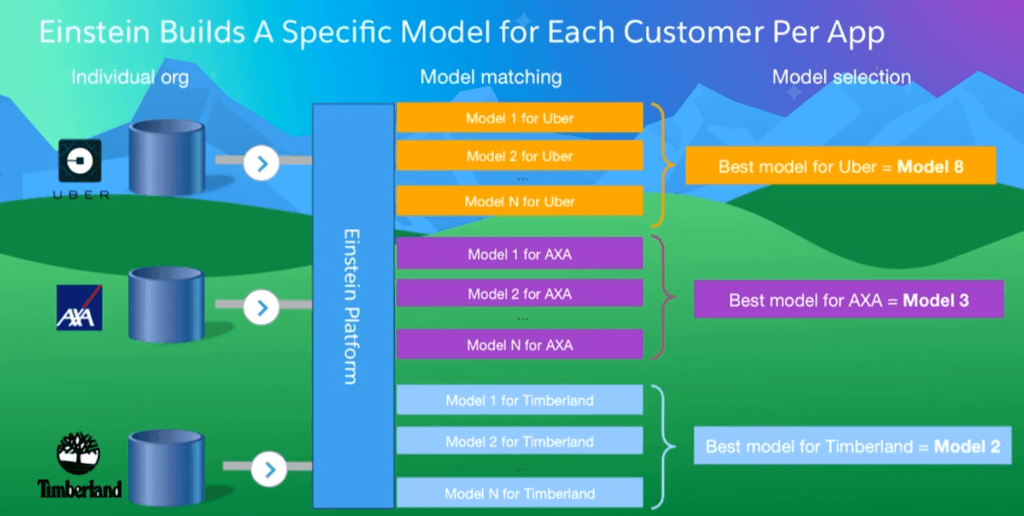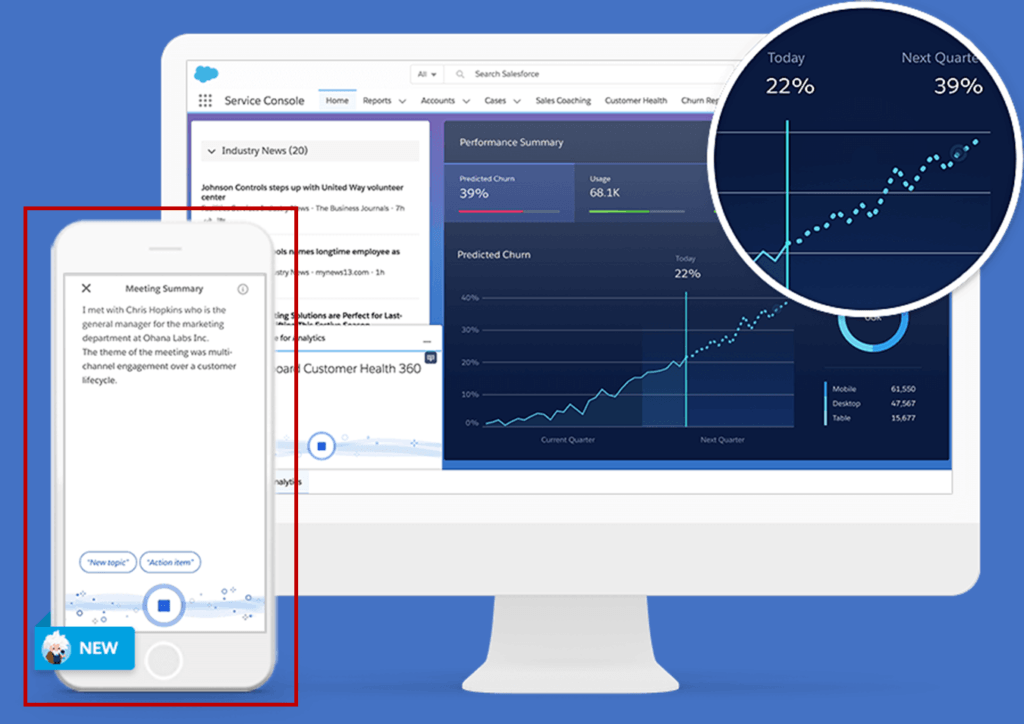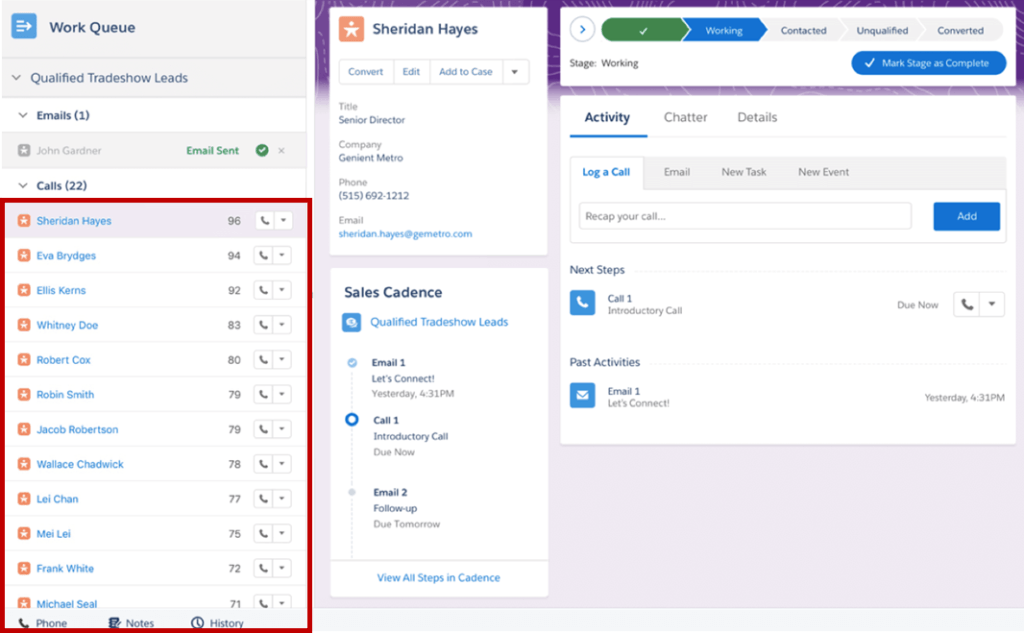Sales=MC2: Salesforce’s Attempt to Democratize Artificial Intelligence

Salesforce has been a leader in the pursuit of cutting-edge technologies addressing the digitalization of sales processes. The Company must continue to do so, if it is to maintain its foothold as the #1 provider of customer relationship management (CRM) software in the United States.
Historically more of an art than a science, the act of selling goods and services has been reinvigorated by the advent of artificial intelligence [1]. Firms that have adapted their ways to incorporate new tools for customer engagement have reaped the benefits of increased market share and employee productivity. Those that have remained steadfast in their traditional ways, may now find themselves trying to play catchup. With the self-described mission of “empower[ing] its customers to connect with their customers” [2], Salesforce has been a leader in the pursuit of cutting-edge technologies addressing the digitalization of sales processes. The Company must continue to do so, if it is to maintain its foothold as the #1 provider of customer relationship management (CRM) software in the United States [3].
An increase in the volume and types of sales metrics tracked in recent years coupled with advancements in machine learning technology have shaped the trajectory of Salesforce’s product development. In 2016, the company launched Einstein, a suite of customizable artificial intelligence tools designed to help its customers “discover insights, predict outcomes, recommend actions and automate tasks” as it sought to “democratize artificial intelligence” for its users [4]. Einstein leverages machine learning in Salesforce’s multi-tenant environment to generate tailored models for each of its enterprise users (please refer to Exhibit A) [5]. Today, the Company utilizes these models to power more than 1 billion artificial intelligence predictions each day [6].
While Salesforce has touted testimonials from large enterprise accounts such as Arizona State University, Palo Alto Networks, Forrester and US Bank as proof of Einstein’s effectiveness [7], more objective reviews of the product have produced mixed results [8]. The Company has also failed to disclose meaningful statistics on user adoption and average return on investment for companies electing to adopt Einstein products [9], bringing to question the readiness of the underlying technology for mass distribution. Nonetheless, Salesforce has forged ahead with its plans to build the world’s “smartest CRM system” as underscored by its continued focus on product innovation and aggressive acquisition strategy. Since 2016, Salesforce has bought more than 15 businesses for an aggregate total of at least $12 billion [10]. Among these are Israeli-based Datarama, a startup specializing in artificial intelligence for marketers acquired in 2018 [11], and MetaMind, an artificial intelligence platform “designed to predict outcomes for language, vision and database tasks” acquired in 2016 [12]. The latter’s founder, Dr. Richard Socher, was a visiting professor of natural language processing (NLP) at Stanford and is currently serving as Salesforce’s Chief Scientist responsible leading research and development efforts for Einstein.
At its world-renowned Dreamforce Conference in September 2018, Dr. Socher introduced an innovative solution to one of sales professionals’ most dreaded tasks: data entry. Einstein Voice, as the new product is called, uses natural language understanding models to process voice notes and “classify [the] types of updates [that sales professionals] need to make to the various fields in Salesforce” (please refer to Exhibit B) [13].
Just a few weeks prior, Salesforce debuted an Einstein integration for its popular business-to-business marketing platform, Pardot, which gives users the ability to better assess prospects “based on indicators of purchase intent” (please refer to Exhibit C) [14].
Einstein’s ability to correctly predict customer behavior is highly reliant on the volume and quality of the underlying data that is fed into its algorithms. Herein lies one of Salesforce’s core competencies and a primary benefit of increasing Einstein’s product mix and the volume of methods through which it can capture information. With operations dating back to 1999 and 150,000+ active customers [15], Salesforce has unique access to what is arguably the best pool of sales data from which to generate predictions. This, combined with Einstein’s seamless integration into existing users’ dashboards, makes the competitive fight for category leader in the intelligent CRM space Salesforce’s to lose.
However, democratizing access to artificial intelligence requires developing a compelling enough product to warrant widespread user adoption, not just a category leading product. If Salesforce is to achieve this lofty goal, it must remain hyper focused on its customers and its people as foundations for future product development decisions. A strong relationship with its customers would enable honest feedback on existing Einstein products while allowing the Company to remain up to speed on shifting pain points. As one of the premier recruiters for top technical talent, it is crucial for Salesforce to foster a culture that enables the professional development of its data scientists and continue monitoring the startup landscape for potential acquisitions that could bolster its research capabilities. With customer input guiding product decisions and industry leading talent executing iterations, Salesforce should be able to democratize access to artificial intelligence. The question still remains: how likely and how quickly is this to happen? Einstein’s guess is as good as mine.
[798 words]
- Victor Antonio, “How AI Is Changing Sales,” Harvard Business Review, July 30, 2018, [https://hbr.org/2018/07/how-ai-is-changing-sales], accessed November 2018.
- Salesforce, 2017 Annual Report, p. 7, [https://s1.q4cdn.com/454432842/files/doc_financials/2017/Salesforce-FY-2017-Annual-Report.PDF], accessed November 2018
- “Salesforce Named #1 CRM Provider For Fourth Consecutive Year,” press release, May 18, 2017, PR Newswire, [https://www.prnewswire.com/news-releases/salesforce-named-1-crm-provider-for-fourth-consecutive-year-300460380.html], accessed November 2018.
- Madlen Nicolaus, “Welcome Salesforce Einstein: AI for the World’s Smartest CRM,” Salesforce Blog, Salesforce, September 19, 2016, [https://www.salesforce.com/uk/blog/2016/09/welcome-salesforce-einstein-ai-for-the-worlds-smartest-crm.html], accessed November 2018.
- Salesforce. “Salesforce Einstein: Machine Learning In A Multi-Tenant Environment,” Salesforce. [https://www.salesforce.com/video/307349/], accessed November 2018.
- Blair Hanley Frank, “Salesforce Einstein now powers over 1 billion AI predictions per day,” Venture Beat, February 28, 2018, [https://venturebeat.com/2018/02/28/salesforce-einstein-now-powers-over-1-billion-ai-predictions-per-day/], accessed November 2018.
- Salesforce, “Customer Spotlights,” [https://www.salesforce.com/products/einstein-analytics/customer-stories/], accessed November 2018.
- Eugene Kim, “Salesforce’s big new product ‘Einstein’ receives mixed reviews despite all the hype,” Business Insider, October 10, 2016, [https://www.businessinsider.com/salesforce-einstein-mixed-reviews-despite-hype-2016-10], accessed November 2018.
- “Corporate Innovator: Meghann York, Senior Director of Product Marketing at Salesforce,” interview by Steven Loeb, Vator, November 7, 2018, https://vator.tv/news/2018-11-07-corporate-innovator-meghann-york-senior-director-of-product-marketing-at-salesforce.
- Source: Salesforce Acquisitions, Capital IQ, Inc., a division of Standard & Poor’s
- Joseph Tsidulko, “Salesforce Beefs Up AI Capabilities With Datorama Buy,” CRN, July 16, 2018, [https://www.crn.com/news/cloud/300106601/salesforce-beefs-up-ai-capabilities-with-datorama-buy.htm], accessed November 2018.
- Connie Loizos, “Salesforce acquires MetaMind,” TechCrunch, April 4, 2016, [https://techcrunch.com/2016/04/04/saleforce-acquires-metamind/], accessed November 2018.
- Michael Machado, “Introducing New Einstein Voice – You Talk, AI Listens,” Salesforce Blog, Salesforce, September 20, 2018, [https://www.salesforce.com/blog/2018/09/introducing-einstein-voice.html], accessed November 2018.
- Barry Levine, “Salesforce adds process improvements to Sales Cloud, Einstein AI to Pardot,” MarTech, September 6, 2018, [https://martechtoday.com/salesforce-adds-process-improvements-to-sales-cloud-einstein-ai-to-pardot-223771], accessed November 2018.
- Salesforce, 2017 Annual Report, p. 4, [https://s1.q4cdn.com/454432842/files/doc_financials/2017/Salesforce-FY-2017-Annual-Report.PDF], accessed November 2018






Einstein’s ability to use artificial intelligence to connect Salesforces’ customers with their users seems incredibly powerful, if implemented properly. I am curious to understand more about the painpoints of customers who have experienced “mixed results” from the Einstein tool. What aspects of Einstein are working well, and where is there room for improvement? What additional underlying data would be helpful to improve Einstein’s outcomes?
Interesting topic and excellent article.
My question is whether ML, in this case acting as an “automated insight generation machine”, works best if delivered directly to customers without any human dependence, or with an actual person distilling the insights?
Of course Einstein’s “express insight” system is more consistent with Salesforce’s current business model, but in my past experience (which may be biased given its services nature), a human touch, coupled with sanity checks and a neat packaging, may greatly increase the value being delivered to clients.
After all, physicists are still trying to reconcile Einstein’s general relativity with Quantum Physics. My fear is that this new Einstein may become similarly incompatible with the other pieces of the business puzzle, even if the fundamentals are all perfect.
I love the concept of democratizing access to machine learning tools. One of the concerns about machine learning is that it will increase income inequality as the largest, most successful corporations are able to deploy these tools and further out compete small businesses. For this reason, I think tools that make AI easily accessible and usable by small businesses (like Einstein) are extremely important. There are still obviously kinks to work out (especially demonstrating ROI for customers!) but the potential of this technology is very high.
Einstein is an inspiring application of artificial intelligence that opens up vast avenues for enterprise customers to generate actionable recommendations from large volumes of data. I must add that although the prospect of leveraging artificial intelligence in this manner is quite appealing, it is important to continue to hone the algorithms to exclude the impacts of certain biases in their predictive algorithms that may disadvantage or attribute certain characteristics to certain customer segments that are not wholesome from a diversity and inclusion perspective. One could see how the systematic recurrence of such misattributions could become very problematic in the long term.
Great post, Albert! I especially appreciate your use of info-graphics to clearly illustrate how the platform works.
While I think Einstein has a strong value proposition, the skeptic in me questions the validity of Salesforce’s claim to “democratize” artificial intelligence. As far as I can tell, this suite of customizable artificial intelligence tools is just another set of products that Salesforce is selling to its enterprise customers, even if it is doing so by embedding them into existing offerings. At its core, artificial intelligence is really just regressing a large volume of data to generate insights about the relationships between certain variables – that is, it’s just a fancy term for data analysis, powered by modern technology. In this sense, I think it falls squarely into the value proposition of Salesforce itself. To truly “democratize” AI and accelerate its adoption, Salesforce would need to open up its technology to the broader public (similar to Valve). I’m not saying that it’s reasonable to expect a private company to do this – I am just saying that I am unconvinced about how genuine Salesforce is in positioning Einstein’s mission as “democratizing artificial intelligence.”
Awesome post! I agree that far and away, Salesforce’s biggest advantage is it’s unique access to the best pool of sales data from which to generate predictions — but the skeptic in me doesn’t see the translation into “democratizing” artificial intelligence; rather, I simply see Salesforce as running intense data analytics (already its core business) and packaging the “artificial intelligence” buzzword as a new product. It seems like there’s a long way to go towards making AI truly available for all.
Great summary of the rollout of machine learning in a more user interactive environment. Salesforce seems uniquely poised to take advantage with their enormous pool of data, but I question why they appear to be so customer specific and customer facing with the models. Building case by case models seems to abandon the advantage that salesforce has, i.e. a large data pool. I would think that generating a few functional models that span many businesses and then maybe just tailoring or tweaking the model for each customer would make more sense.
Mr. Einstein, I am most impressed by Salesforce’s marvelous innovation which bears your namesake. I can see many useful applications for the product from a salesperson’s perspective — it appears to help them understand their weaknesses and ultimately increase their effectiveness as salespeople. However, I wonder if there are any legitimate concerns around the sheer amount of data that Salesforce has access to via this product. Are companies comfortable with allowing a cloud-based service like Salesforce to have access to detailed internal “voice notes” that their salespeople generate? Could there be valuable competitive data that is being given up, in exchange for the relative benefits that AI provide? The functionality of the tool is useful, but I wonder if companies would prefer having that data secured internally.
This is a great article. Thanks for sharing. From a marketing perspective, I wonder whether Salesforce should compete in other markets. It seems as if their focus is solely on the United States and maintaining dominance in that market. Would their business be better served focusing on developed markets such as China and Europe? The artificial intelligence component of their product surely would be a breakthrough in any of these markets.
I’m not from your section but I used to work on the Einstein product team prior to business school, it made me so happy to read your insights/write-up!